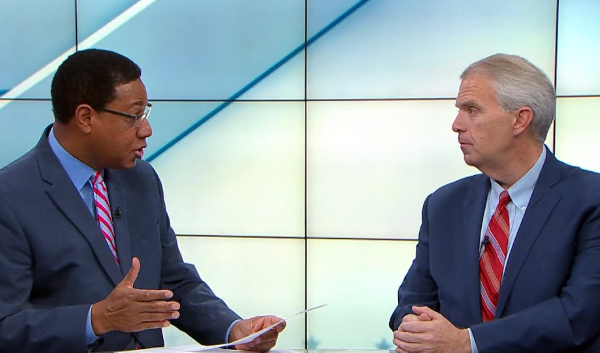Seven broadcasters and a radio manager gathered on April 21 at the School of Journalism and New Media at the University of Mississippi. Amanda Fontaine, executive director of the Mississippi Association of Broadcasters asked them several questions about the current state of the industry, as well as advice they could give to numbers of students about to graduate and therefore enter the job market.
Q: Where are we now in terms of jobs after the pandemic, how did the profession change?
What has really changed during the pandemic lies more in how journalists have been doing their job, explains news director Liz Zamora at WTVA. Due to social distancing and other measures, journalists had to get innovative and adjust to new norms: dealing with bad audio because of the distance with the interviewee, technical issues, lack of access to some places and people. Moreover, newsrooms had to deal with colleagues getting sick and not being able to work.
The broadcasters mentioned that with almost everyone owning a smartphone, the time when people logged in at fixed hours to watch the daily newscast is gone, and journalists have to adapt to that. The industry is hungry for good storytellers because journalists are now competing with people’s Facebook or Instagram.
“We’re getting farther and farther away from ‘I’m going to have to be at home so I can watch 5 o’clock news’ to ‘I can watch whenever I want to, I can watch [the news] while I’m at my doctor’s office, I can watch while waiting in line to get my shot.’ We have to adjust to that,” Zamora says.
Looking at the new generations, journalists now have to be infotainers. Younger people, especially those referred as “Gen Z,” both want to be informed and to be entertained. Journalists have to adapt to the demand.
Q: Is there an increase or a decrease in job availability?
According to Rick McLaughin, news director at WAPT, it all depends on the company. The pandemic caused a huge number of layoffs in the industry, but some groups decided to keep all of their employees. Therefore, choosing which company you want to work for is an important decision, for some companies will be investing in you more than others.
As for job openings, technology is bringing a great number of opportunities. New platforms get developed and have to be filled with content that fits both the platform and its audience. Content is king and needs to be generated.
“A lot of content has to be created. The key is if you’re willing to pivot and be flexible and learn and accept some constructive criticism, there are a lot of opportunities,” says RaMona Alexander, general manager and general sales manager of WDBD.
There are not fewer jobs, just different jobs. Everything is changing so fast — look at the past year — you have to be willing to adapt. And if you are entering the market just newly graduated from college, you are the generation that news services are trying to attract among their audience. Bring your talent and bring your ideas, says Mark Little, news director at WLBT.
Q: How has the viewership changed since COVID?
The pandemic made viewership drastically increase because people were in need of information. Now, there has been an expected decrease, since viewership more or less came back to a normal rate. However, digital platforms are still scoring high in terms of viewership, since that is where people turn to first.
“We’re probably failing if our newscast starts at 6 pm with a story that is from 10 o’clock in the morning. Because you already know that, and you’re not going to sit down to watch the rest of our newscast if we’re telling you something that is 8 hours old. Our job now, because of the technology, is to find innovative ways to tell you the newest information as you sit down to watch,” says Brad Kessie, news director at WLOX.
Throughout the pandemic, local journalists have solidified their role in the country as a preserver of the 1st amendment, as well as solidified their role as true journalists. They are the voices of the community, and the next generation of journalists are going to be the whom the people are going to turn to and trust, adds Jacque Harms, general manager at WTOK.
Q: What are some ethical challenges you may have seen in young, less experienced journalists?
Bias is one of the toughest ethical issues journalists face.
“If I can look at somebody’s story and know how they feel about the subject, then that’s a definite disservice to the viewers,” Zamora says. “I always tell people if you get angry phone calls on a controversial story from both sides, that’s a good thing.”
Broadcast journalists in Mississippi often find themselves reporting in local communities where they know the people they are reporting on. That can be a challenge to less experienced journalists, leading to bias. Joey Barnes, news director at WCBI believes young reporters also often are afraid to ask tough questions.
Journalists also need to remember how to be journalists and not mouthpieces, says Kessie. As for McLaughin, he underlines having information does not entail reporting that information. Journalists must report the truth but also comply with the “minimize harm” ethical standard of the profession.
“Don’t think just because you have the information that that necessarily means it’s your right or your duty to report it. Sometimes it’s your duty to not report it,” McLaughin says.
When to report and when not to is a good example of a conversation that young journalists should be having with their news director. Do not be afraid to ask those questions: agencies have different standards. Little also advises working with your gut feeling: if something does not feel right, it is probably not.
Q: How to prepare for a job interview?
Alexander’s advice is pretty relatable: treat a job interview the same way as you would treat a first date. Do your research ahead to know who you will be talking to: do not wait until the night before to watch a newscast or to google the people who are going to interview you. Come prepared, and come dressed for the occasion. Make sure that everything about you is perfect when you go on that first date. But keep in mind: the date also has to impress you!
“Be prepared on your job interview to ask questions. We look for questions. When we are interviewing you, we want to like you, we want to hire you: it’s a courtship! I want to get to know you, you want to get to know me, and hopefully, we have some common ground and we have more than one date. We have what is called a job,” Alexander says.
Get some information on the industry: what is currently happening? There are plenty of resources available for you: Broadcasting & Cable, TV News Check (you can sign up to their newsletter for free and get all the updates on the industry), NextGenTV ,and ATSC 3.0. There are also plenty of books that deal with how to succeed in job interviews.
As obvious as it sounds, do not ask about money nor vacation during the interview. You will work late, as well as during weekends and holidays.
“When you are doing your google search, we are doing your social media search,” explains Kessie. Do you look good on all of your platforms? If you have anything questionable on your platforms, erase it now. Pictures, political opinions, anything belonging to your college years. You will lack credibility if your social media presence does not reflect your professional self, and companies will likely not hire you if you do not represent them in a suitable way.
It is okay to be nervous, as long as you come prepared. Some interviews will include a test: you will be given a scenario, for which you will have 15 minutes to digest and to prepare an interview following the scenario. It is okay to not excel and even to fail in those, you are not supposed to know everything about the job just yet. It is the way you handle yourself when the lights are on and how you handle the pressure that is looked at.
Q: What makes a good reel?
A reel is your one chance at impressing an employer. Do not mess it up because of avoidable mistakes: make sure there are no grammar errors, the audio must be good, there should not be black frames in your reel. Do not make a news director work: they should not have to adjust the audio or dig for your contact information. Your reel should be your best work, your best version of yourself.
“Make sure this is impactful, show your personality, how do you present yourself, what kind of voice do you have, we can learn a lot about your personality in a few seconds. Simply this is just to have someone call you back,” Harms says.
Be clear, concise, and confident. Do not include in your reel footage already present in your packages: show different things. You can have several reels: a sports reel and a news reel, for instance, that is called knowing who you are interviewing with and for what job. Creativity captures the attention, so be creative!








